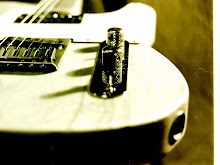Early reports on Dylan’s new album, Tempest (released on 9/11 like his eponymous debut record and 2001’s Love and Theft), suggested that it is his darkest record yet. This notion is belied by the upbeat breeziness of the album’s two opening tunes. But it is, in fact, a fairly accurate assessment of the album’s remaining eight tracks.
Tempest, even more than most Dylan offerings, is all about the words. The music, while adequate, mainly just sets the groove over which the Bard’s verses – and there are many! – unfold. Music wise, there are few hooks, memorable melodies or “catchy“ tunes.
For many, that may be fine, since Dylan really is about the
wordplay and the message. For me, though, the coupling of those things with
poignant music is what distinguishes Dylan’s most lasting work from the rest of
the chaff, and there's no denying: the musical muscle – in the songs – not the musicianship – is a bit lacking on Tempest.
That said, there are a few unsuspected standouts musically,
even little things like the maracas on “Early Roman Times”;
the downshift of the rhythm section that segues into the some tasty,
understated lead guitar in the coda of “Duquesne Whistle” and the
interplay of the various stringed instruments on “Scarlet Town.”
With so much focus on the words, though, I do wonder how
much of the verbiage is Dylan’s doing and how much came from the pen of
co-lyricist Robert Hunter (he of Grateful Dead renown). The themes certainly
echo Dylan’s particular – some might say peculiar – views.
In talking about this new batch of songs to Rolling Stone a few weeks before its
release, Dylan said that he initially thought he was going to do a religious
album, but it turned out to be something else. I’m not sure how true that
is. It’s not unlike Bob to be coy about such matters.
I hear definite religious aspects in much of Tempest. No, it’s not the overt proselytizing of Dylan’s notorious late ’70s Born Again phase as heard on Saved or Slow Train Coming, but there is definitely an apocryphal vision running through much of the album that represents Dylan’s ongoing fascination with the End Times. That’s OK, though. Done right, it’s good subject matter.
For me, the peak of the album comes about midway through with the one-two punch of “Scarlet Town” and “Early Roman Kings.” The former, the album’s best track, is a dark, banjo and haunting fiddle-driven folk ballad. The latter, though lyrically one of the better songs, is an endlessly chugging blues, enlivened only by the swampy organ and effect-laden harmonica bursts. The band churns away beneath Bob’s verses of dispirited, ill-fated people living in a depraved world. Dylan still digs Armageddon.
I hear definite religious aspects in much of Tempest. No, it’s not the overt proselytizing of Dylan’s notorious late ’70s Born Again phase as heard on Saved or Slow Train Coming, but there is definitely an apocryphal vision running through much of the album that represents Dylan’s ongoing fascination with the End Times. That’s OK, though. Done right, it’s good subject matter.
For me, the peak of the album comes about midway through with the one-two punch of “Scarlet Town” and “Early Roman Kings.” The former, the album’s best track, is a dark, banjo and haunting fiddle-driven folk ballad. The latter, though lyrically one of the better songs, is an endlessly chugging blues, enlivened only by the swampy organ and effect-laden harmonica bursts. The band churns away beneath Bob’s verses of dispirited, ill-fated people living in a depraved world. Dylan still digs Armageddon.
There are two parlor ballads that evoke images of the 1890s:
the album’s jaunty opener “Duquesne Whistle” and the tale of the Titanic told in the album’s title track. Dylan goes on to croon romantically over weeping pedal steel on the ’50s-ish pop ballad tonality of “Soon
After Midnight.”
The rest of the way, though, the music is bluesy vamps,
shuffles (“Narrow Way”) and pulsing banjo-propelled dirges (“Tin Angel”) mixed
with haunting, minor key, folk ballads. The one exception is “Pay in Blood,” which
sounds like a mid-tempo, modern-era Stones song with multi-layered instrumentation
featuring prominent electric piano and guitar.
Overall, Tempest
is a decent, listenable, modern era Dylan album. It ranks above Modern Times (2006) and Together
Through Life (2009), not quite on par with Love and Theft (2001) and nowhere near Time Out of Mind (1997). A Gentleman’s B.





